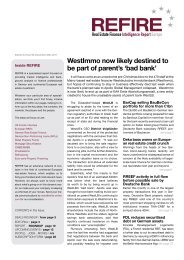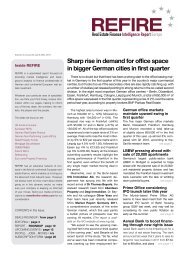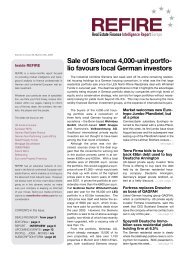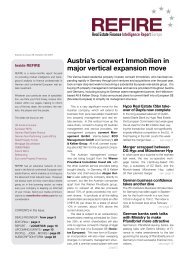vestor Level One files for insolvency - Intelligence Report - REFIRE
vestor Level One files for insolvency - Intelligence Report - REFIRE
vestor Level One files for insolvency - Intelligence Report - REFIRE
Create successful ePaper yourself
Turn your PDF publications into a flip-book with our unique Google optimized e-Paper software.
ower than these well-established sites, although<br />
they work the same way. Developers,<br />
architects, in<strong>vestor</strong>s, analysts, valuers,<br />
facility managers, brokers, engineers and<br />
planners will find it useful, we think – in fact,<br />
anybody contributing in some way to the life<br />
cycle of individual commercial buildings. The<br />
language of the website is English, in keeping<br />
with the international background of most of<br />
the site’s visitors.<br />
The website was launched at the MIPIM<br />
in March under the auspices of Germany’s<br />
federal Economics and Technology ministry<br />
in Berlin. The site revolves around individual<br />
Don’t move - or if you do, move east<br />
It’s a common complaint in Germany by landlords that the socalled<br />
‘Mietspiegel’ or maximum permissible residential rent fixed<br />
in a neighbourhood, discourages investment by keeping rents<br />
artificially low at landlords’ expense. New development, too, is<br />
said to be hindered by the low level of rents achievable. However,<br />
recent research shows that, at least <strong>for</strong> new tenancies, residential<br />
rents are rising strongly in Germany’s largest cities as in<strong>vestor</strong>s<br />
and landlords find ways to raise rent levels.<br />
A recent study by Jones Lang LaSalle shows a widening<br />
discrepancy between the rents payable by new tenants (‘offered<br />
rents’) and those who don’t move, whose rents are protected by<br />
law, in Berlin, Düsseldorf, Frankfurt, Hamburg and Munich. The<br />
study delved into individual neighbourhoods within these cities to<br />
provide a more complete picture than other more general studies.<br />
The JLL study examined 130,000 in its City Profile from the<br />
first half of this year, and found that the ‘offered rents’ were diverging<br />
strongly from rents payable by sitting tenants. New tenants in<br />
the most desirable parts of Berlin, such as Prenzlauer Berg and<br />
Mitte, were paying nearly �8.00 per sq.m <strong>for</strong> a renovated apartment<br />
in an older building, nearly 50% more than indicated by the<br />
‘Mietspiegel’ <strong>for</strong> the neighbourhoods.<br />
According to Stefan Mergen, responsible <strong>for</strong> residential valuations<br />
at JLL, “This trend is going to continue, and will be probably<br />
even more extreme than expected. It just shows that the<br />
‘Mietspiegel’ is being completely ignored, in favour of what the<br />
market will bear. We’re seeing the same thing in Hamburg and<br />
the other larger cities.”<br />
The research institute Empirica, which carries out its own<br />
studies on rental levels, confirmed JLL’s findings of generally rising<br />
rents nationwide. It found that in 70% of 118 German cities the<br />
‘offered rents’ have been rising steadily since the last quarter of<br />
commercial property projects, with users who<br />
played a role in the property’s development<br />
cleverly linked up, able to send secure messages<br />
to each other, and discuss new projects.<br />
Over 500 property projects worldwide<br />
are currently featured on the site. Registration<br />
is free. You can join the community at www.<br />
ourbania.com<br />
Germany/Banking<br />
SEB plans change to structure<br />
of German unit<br />
Swedish bank SEB said last week it was chang-<br />
2005. In Neubrandenburg, <strong>for</strong> example, it found that the average<br />
rent had risen by 26% within the ten quarters, from �4.27 to �5.36 per<br />
sq.m/month. The ‘Mietspiegel’ certainly wouldn’t permit that.<br />
Meanwhile, a company called F&B Forschung und Beratung<br />
für Wohnen, Immobilien und Umwelt GmbH has just produced<br />
the “Mietspiegelindex 2008”, a comprehensive guide <strong>for</strong> all the recommended<br />
official rent levels throughout Germany. The researchers<br />
examined rent levels <strong>for</strong> a 65 sq.m apartment, built to normal or<br />
average specifications in a normal or average area. While the average<br />
rent comes to �5.91 per sq.m/month, there are wide regional<br />
variations.<br />
In the northern part of Germany, most rents correspond to the<br />
average. But in the south, in the states of Baden Württemberg<br />
and Bavaria, and in the middle (Hesse and Rhineland-Palatinate)<br />
the average rents are �7.21 and �6.32 respectively (per sq.m/month),<br />
tenants pay considerably more. North Rhine-Westphalia is slightly<br />
below average, while in the eastern states, including Berlin, rents are<br />
well below average.<br />
The average rent in Munich at �9.81 is 66% above the national<br />
average, and is the highest in the country. Even towns well outside<br />
the centre of Munich rank among the highest in the country, with<br />
the towns of Germering and Dachau ranked two and three on the<br />
national list.<br />
Berlin is the place to live cheaply, with apartments in the western<br />
part of the city 3% below the national average, and east Berlin 10%<br />
below the mean. Renting in Munich is thus fully 70% more expensive<br />
<strong>for</strong> its inhabitants than living in the nation’s capital – where else<br />
do you find this? To really save money, live in an eastern German<br />
city, none of which feature in the top 30 most expensive places to<br />
rent. Then rent a newly-built apartment, which in contrast to the<br />
west will cost less than a renovated older building. With all these<br />
savings you can buy an excellent computer, and plenty of broadband<br />
capacity. And then become a telecommuter…<br />
20<br />
ing its structure to separate its retail banking<br />
business from merchant banking and real estate<br />
operations in Germany.<br />
The market has recently speculated that<br />
SEB might hive off its German retail banking division,<br />
acquired some years ago from Germany’s<br />
labour union bank BfG. SEB did not mention a<br />
possible sale, but did say that it wanted to take<br />
advantage of the merger and acquisition landscape<br />
in Germany. In a statement, the bank<br />
said, “The organisational change is of internal<br />
character solely and will have no implications on<br />
daily operations. SEB Asset Management is not<br />
part of the organisational change process.”






